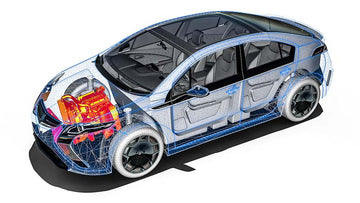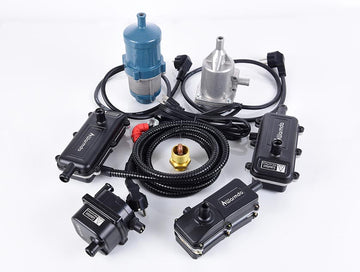How to Choose the Right Engine Heater
Jul 20, 2024
As winter approaches, the difficulty of starting engines increases. If you're looking for a solution, you've come to the right place.
If you don't want to delve into our detailed articles, you can directly choose the Vvkb engine block heater with a built-in circulation pump, one of the most advanced and popular engine heaters on the market.

Why Use an Engine Heater
In extremely low temperatures, engine components can expand their clearance due to cold shrinkage. Additionally, low temperatures significantly reduce the fluidity of engine oil, increasing friction between engine parts, thus lacking sufficient lubrication.
Cold starts are not only difficult, but forced starts can exacerbate engine wear (it is reported that one cold start is equivalent to driving a vehicle 100 kilometers under normal conditions).
Installing an engine heater can effectively solve these problems.
By preheating the engine, the heater not only shortens the cold start process but also reduces various potential winter failures, significantly extending the engine's lifespan.
For those living in cold climates or planning to travel to cold areas, an engine heater is an essential piece of equipment.
Let's take a closer look at engine heaters.
 The effect of the Warmda engine heater
The effect of the Warmda engine heater
What is an Engine Heater and how does it work?
First, let's understand what an engine heater is and how it operates. An engine heater, also known as an engine preheater, is one of the essential accessories for vehicles during the winter. Its main function is to preheat the vehicle's engine coolant, engine oil, or engine block, making it easier to start the engine in cold weather.
The use of this device can significantly reduce wear during engine startup, lower fuel consumption, and decrease harmful emissions, thus ensuring the engine starts smoothly. Engine heaters are particularly beneficial for vehicle owners living in cold regions. Especially in winter, when external temperatures are extremely low, an engine that has not been preheated may struggle to start normally.
After understanding how an engine heater works, you might also want to know the specific benefits it can bring to you.
Next, we will explore the benefits of using an engine heater.
 The effect of the Vvkb engine heater
The effect of the Vvkb engine heater
Benefits of Using an Engine Heater
Using an engine heater provides several significant benefits:
Maintains Optimal Engine Condition:
Diesel engines operate on the compression ignition principle, requiring good cylinder airtightness. In low temperatures, engine components might contract due to cold shrinkage, increasing wear due to larger clearance gaps. Preheating the engine ensures appropriate clearance before starting, providing adequate lubrication between components. This not only protects the engine from premature wear but also reduces maintenance costs.

Car connection power supply with Warmda engine heater
Improves Fuel Efficiency:
In cold weather, an unpreheated engine may suffer from poor combustion due to inadequate fit between cylinders and pistons, increasing exhaust emissions. Preheating the engine improves this condition, ensuring complete fuel combustion and reducing environmental pollution. Additionally, preheating helps enhance the efficiency of the catalytic converter, further lowering harmful emissions.
More Effective Starting and Operation:
During the cold winter months, an engine heater preheats the coolant and lubricating oil, reducing the time needed for cold starts, making it easier for the engine to start and quickly reach optimal operating temperatures.
Saves Fuel Costs:
At extremely low temperatures, an unheated engine needs to burn more fuel to reach operating temperature. Using an engine heater appropriately can reduce this fuel consumption, thus saving costs.
Environmental Friendly:
Using an engine heater reduces harmful gas emissions produced during cold starts and idling. Lowering fuel consumption not only saves you money but also reduces your vehicle's greenhouse gas emissions, combating climate change.
Next, we will explore the mainstream engine heaters available on the market.

Vvkb Engine Block Heater Titan-P3
Common Types of Engine Heaters and Their Comparison
The market offers several common types of engine heaters, each with unique features and applications. Here are the types you should consider:
Core/Frost Plug Heaters:
- Structure: Consists of a heating element, a base made of ferrous material, and connecting wires.
- Installation: Typically installed in the engine’s frost plug location, replacing the original frost plug.
- Function: Directly heats the engine’s coolant, transferring heat to the engine block through the coolant.
- Note: Although simple in structure and widely used, replacing a damaged heating tube can be complex.

Tank-style Engine Heaters:
- Advancement: More complex than frost plug heaters, including heating elements and a thermostat.
- Function: Connected to the vehicle’s cooling system, it heats the coolant to preheat the engine.
- Features: The heated coolant enters the engine through gravity circulation and includes a thermostat to prevent overheating.

Engine Block Heaters with Built-in Water Pumps:
- Innovation: Introduced by Victor Industries Ltd in 1998, it added a built-in water pump to assist circulation.
- Function: The heating element and water pump work simultaneously to accelerate coolant circulation, reducing preheating time.
- Safety: Equipped with two thermostats to ensure safety.
Oil Pan Heaters:
- Types: Includes electromagnetic heaters and silicone pad heaters.
- Function: Electromagnetic heaters use a changing magnetic field to heat the oil pan, while silicone pad heaters use electric heating elements to directly heat the oil pan.
Air Inlet Heaters:
- Function: Installed in the intake manifold, it heats the air electrically to help diesel atomize more easily.
Glow Plugs:
- Function: Similar to air inlet heaters, they heat the air in the intake manifold to facilitate engine starting.

Vvkb Glow Plugs
Dipstick Heaters:
- Function: Replace traditional dipsticks, heating the oil to provide lubrication.
Engine Insulation Blankets:
- Usage: An external emergency heating product, typically covering the engine that needs to be heated.
These heaters offer various solutions to the challenges of cold starts in winter, catering to different vehicle needs and preferences.
Summary
In this article, we have explored various types of engine heaters, including frost plug heaters, tank-style heaters, engine block heaters with built-in water pumps, and several other auxiliary heating devices. Each type of heater has its unique functions and applications, designed to enhance engine start performance, increase fuel efficiency, and reduce environmental pollution.
Choosing the right engine heater is crucial for maintaining optimal performance of your vehicle in cold conditions. In this regard, Vvkb brand engine heaters stand out in the market for their innovative design, high efficiency, and safety. Whether it's a simple frost plug heater or a high-tech engine block heater with a built-in water pump, Vvkb offers high-quality solutions that ensure your engine operates efficiently under any climatic conditions.
If you have any questions about Vvkb's engine heaters or choosing the right type of heater, our professional team is ready to assist you. Do not hesitate to contact us for more information, and let us help ensure your vehicle receives the best care and performance.
Choose Vvkb for the highest quality starting and running experience for your vehicle.





2 comments
Bonjour.
J’ai un tracteur diesel FORD 2600 qui a 50 ans.
Il ne démarre pas bien l’hiver car il n’est pas utilisé pendant de longues périodes.
Dites-moi le réchauffeur de moteur VVkb le plus plus adapté pour ce type de tracteur de 2,6 litres de cylindrée.
Si vous le pouvez, communiquez-moi les liens www. pour le commander .
Je vous remercie.
Zues-F1 install manual copy available?